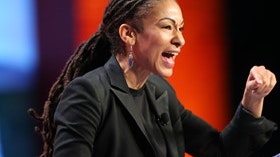Homepage
•
Learning Library
•
Blog
•
Ruha Benjamin: Let's bring everyone to the table
Expand breadcrumbs
Expand breadcrumbs
- Learning Library
- Blog
- Ruha Benjamin: Let's bring everyone to the table
- Homepage
- •
- Learning Library
- •
- Blog
- •
- Ruha Benjamin: Let's bring everyone to the table
Ruha Benjamin: Let's bring everyone to the table
By Team ISTE
December 28, 2018








